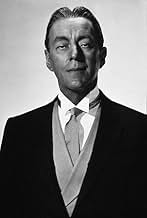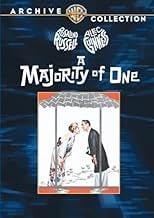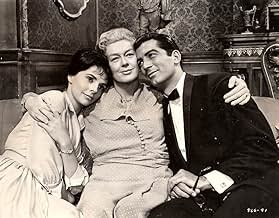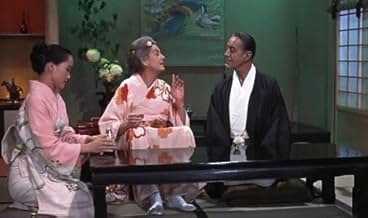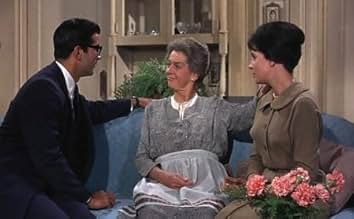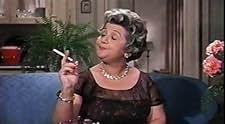IMDb रेटिंग
6.7/10
1.3 हज़ार
आपकी रेटिंग
अपनी भाषा में प्लॉट जोड़ेंA gentle love story about a Japanese businessman and widower, and a Brooklyn widow. But before a happy ending can ensue, they must learn again the lessons of tolerance, kindness, and forgive... सभी पढ़ेंA gentle love story about a Japanese businessman and widower, and a Brooklyn widow. But before a happy ending can ensue, they must learn again the lessons of tolerance, kindness, and forgiveness.A gentle love story about a Japanese businessman and widower, and a Brooklyn widow. But before a happy ending can ensue, they must learn again the lessons of tolerance, kindness, and forgiveness.
- 1 ऑस्कर के लिए नामांकित
- 3 जीत और कुल 4 नामांकन
Mae Questel
- Essie Rubin
- (as Mae Questal)
Harriet E. MacGibbon
- Lily Putnam
- (as Harriet MacGibbon)
Lillian Adams
- Mrs. Stein
- (बिना क्रेडिट के)
Leon Alton
- Ship Passenger
- (बिना क्रेडिट के)
Monya Andre
- Ship Passenger
- (बिना क्रेडिट के)
Mary Chan
- Spectator at Disembarkation
- (बिना क्रेडिट के)
Spencer Chan
- Ship Passenger
- (बिना क्रेडिट के)
फ़ीचर्ड समीक्षाएं
Warner Bros. cast movie stars Rosalind Russell, and Alec Guiness in this movie based on the hit Broadway play directed by long time veteran Mervyn Le Roy with very fine Warner Bros production values.
Rosalind Russell an Irish Catholic Yankee was cast as a Brooklyn Jewish Matron, the part played by Gertrude Berg on Broadway. There is a lot of mileage between Roz Russell and Gertrude Berg! English star ( and also Catholic) Alec Guiness was assigned to play the Japanese male lead. Ms. Russell had a lot of talent and is one of the most glaring examples of a great actress who never won an Oscar. Alec Guiness right off his great Oscar win in The Bridge On The River Kwai playing the English officer tormented by his Japanese captors is elegant and intelligent in his performance in this film. Due to the deft professionalism and talent do these two very fine Stars pull off their characterization's.
Gary Vinson and Sharon Hugueny both WB stars are listed in the credits but I only saw them briefly. Warners contract star Ray Danton is fine in this film.
Rosalind Russell an Irish Catholic Yankee was cast as a Brooklyn Jewish Matron, the part played by Gertrude Berg on Broadway. There is a lot of mileage between Roz Russell and Gertrude Berg! English star ( and also Catholic) Alec Guiness was assigned to play the Japanese male lead. Ms. Russell had a lot of talent and is one of the most glaring examples of a great actress who never won an Oscar. Alec Guiness right off his great Oscar win in The Bridge On The River Kwai playing the English officer tormented by his Japanese captors is elegant and intelligent in his performance in this film. Due to the deft professionalism and talent do these two very fine Stars pull off their characterization's.
Gary Vinson and Sharon Hugueny both WB stars are listed in the credits but I only saw them briefly. Warners contract star Ray Danton is fine in this film.
For the first time I have seen the film A MAJORITY OF ONE. I also have been reading some of the reviews here on IMDb. So many of them harp on the fact that Alec Guinness was cast as the Japanese businessman who falls in love with Rosalind Russell's lonely Jewish widow. For that matter, some take exception to the casting of the Catholic Miss Russell as Mrs. Jacoby.
It's called acting, people! Mr. Guinness and Miss Russell certainly convinced me that they were these people - an elderly lonely Jewish widow and an equally elderly lonely Japanese widower who meet and, although from very different cultures, find a common ground.
This was a beautifully performed and profoundly moving story. I don't know how I've managed to never see it before. It left me feeling all warm and fuzzy inside. I will certainly be adding this film to my collection.
It's called acting, people! Mr. Guinness and Miss Russell certainly convinced me that they were these people - an elderly lonely Jewish widow and an equally elderly lonely Japanese widower who meet and, although from very different cultures, find a common ground.
This was a beautifully performed and profoundly moving story. I don't know how I've managed to never see it before. It left me feeling all warm and fuzzy inside. I will certainly be adding this film to my collection.
Alec Guinness acts as an elderly, influential Japanese businessman in this romance / comedy / drama set in the background of the aftermath of World War II .
When you see this film, you will, not for a minute, imagine that Mr. Koichi Asano (played by Alec Guinness ) is anything other than Japanese - so complete is the effort put in by this great actor.
Superb acting from both Alec Guinness and Rosalind Russell and a unique background of Japanese culture make this a very memorable movie.
A 'must' for all Alec Guinness fans !
When you see this film, you will, not for a minute, imagine that Mr. Koichi Asano (played by Alec Guinness ) is anything other than Japanese - so complete is the effort put in by this great actor.
Superb acting from both Alec Guinness and Rosalind Russell and a unique background of Japanese culture make this a very memorable movie.
A 'must' for all Alec Guinness fans !
Unlike a few of her female contemporary film stars from the Thirties, Rosalind Russell managed to avoid the perils of being cast in horror films because it was the only roles she was offered. I think only Katharine Hepburn exercised better discretion in her parts even if for Russell they weren't always completely successful with audiences and critics.
Case in point is A Majority Of One. The play by Leonard Spiegelgass ran for 559 performances in the 1959-1960 season, it was a popular hit as well with Jewish audiences. Mainly because the play was done by THE Jewish American mother from radio and television, Gertrude Berg. As a small kid I do recall the lives and loves of Molly Goldberg and her family were almost a rite on the nights it was broadcast for my Jewish relatives. Berg was a natural for the part of the Jewish widow from 776 Eastern Parkway in Brooklyn.
Anyway this tall prominent lay Catholic from Connecticut does give it a good try and she succeeds in many ways. Today's audiences in seeing this film don't have the memory of Gertrude Berg as Molly Goldberg to fall back on, so Russell's performance is more likely to be judged on its own merits. It's not a bad one.
The other casting however was and remains more controversial. Alec Guinness is one of those actors who can play just about any racial or ethnic type and has. He succeeded his fellow countryman Cedric Hardwicke who played the role of the Japanese industrialist on Broadway. Doesn't mean he should have though. If A Majority of One were made even 20 years later and if players were frozen in time, Jack Warner might have given serious consideration to casting a real Japanese in Sessue Hayakawa as the Japanese widower industrialist. That would have really been something, but at that time the film would have bombed at the box office.
Interesting too because the subject of the film is overcoming our prejudices. Rosalind Russell's son was killed in the Pacific Theater in World War II. She's a widow and when her son-in-law Ray Danton who is a career foreign service officer her daughter, Madelyn Rhue and Danton think she ought to go to Japan where he's been assigned his next post.
They fly to the Pacific and take a sea voyage to Japan where Russell meets Alec Guinness, a widower who's daughter was killed at Hiroshima. Despite his strict Buddhist faith and her Orthodox Jewish background, love can bloom in the strangest places and is good the second time around.
Russell admired Guinness's cerebral technique and total concentration on character when she worked with him. In a recent biography of Alec Guinness, nothing was mentioned about him and Russell, but he felt he was not given any kind of direction from Mervyn LeRoy. Both Russell and Guinness were heavy into Catholicism so I'm betting they got along.
Two members of the original Broadway cast made it to Hollywood, Mae Questal as Russell's neighbor and Marc Marno as their Japanese servant when they set up home in Japan. Questal has an interesting scene with Ray Danton when she announces she just doesn't like her new Puerto Rican neighbors. Danton rather self-righteously upbraids her for her prejudice, but then comes face to face with his own after making a fool of himself with Guinness during business and then facing the prospect he might have an oriental stepfather-in-law.
A Majority of One is a good film, in many ways better enjoyed now than when it first came out. But it misses greatness due to the timidity of the times in Hollywood.
Case in point is A Majority Of One. The play by Leonard Spiegelgass ran for 559 performances in the 1959-1960 season, it was a popular hit as well with Jewish audiences. Mainly because the play was done by THE Jewish American mother from radio and television, Gertrude Berg. As a small kid I do recall the lives and loves of Molly Goldberg and her family were almost a rite on the nights it was broadcast for my Jewish relatives. Berg was a natural for the part of the Jewish widow from 776 Eastern Parkway in Brooklyn.
Anyway this tall prominent lay Catholic from Connecticut does give it a good try and she succeeds in many ways. Today's audiences in seeing this film don't have the memory of Gertrude Berg as Molly Goldberg to fall back on, so Russell's performance is more likely to be judged on its own merits. It's not a bad one.
The other casting however was and remains more controversial. Alec Guinness is one of those actors who can play just about any racial or ethnic type and has. He succeeded his fellow countryman Cedric Hardwicke who played the role of the Japanese industrialist on Broadway. Doesn't mean he should have though. If A Majority of One were made even 20 years later and if players were frozen in time, Jack Warner might have given serious consideration to casting a real Japanese in Sessue Hayakawa as the Japanese widower industrialist. That would have really been something, but at that time the film would have bombed at the box office.
Interesting too because the subject of the film is overcoming our prejudices. Rosalind Russell's son was killed in the Pacific Theater in World War II. She's a widow and when her son-in-law Ray Danton who is a career foreign service officer her daughter, Madelyn Rhue and Danton think she ought to go to Japan where he's been assigned his next post.
They fly to the Pacific and take a sea voyage to Japan where Russell meets Alec Guinness, a widower who's daughter was killed at Hiroshima. Despite his strict Buddhist faith and her Orthodox Jewish background, love can bloom in the strangest places and is good the second time around.
Russell admired Guinness's cerebral technique and total concentration on character when she worked with him. In a recent biography of Alec Guinness, nothing was mentioned about him and Russell, but he felt he was not given any kind of direction from Mervyn LeRoy. Both Russell and Guinness were heavy into Catholicism so I'm betting they got along.
Two members of the original Broadway cast made it to Hollywood, Mae Questal as Russell's neighbor and Marc Marno as their Japanese servant when they set up home in Japan. Questal has an interesting scene with Ray Danton when she announces she just doesn't like her new Puerto Rican neighbors. Danton rather self-righteously upbraids her for her prejudice, but then comes face to face with his own after making a fool of himself with Guinness during business and then facing the prospect he might have an oriental stepfather-in-law.
A Majority of One is a good film, in many ways better enjoyed now than when it first came out. But it misses greatness due to the timidity of the times in Hollywood.
Of course the producers needed some names to carry this, and after all, Guinness could play anything, right? Here we have Sir Alec in a variation on his standard Refined Exotic Man, very similar to his Prince Faisal in Lawrence of Arabia and Brahmin Professor Godbole from A Passage to India. On Broadway Mr. Asano was played by Cedric Hardwicke, so this was simply continuing established --and highly outdated-- practice.
At least the onstage Mrs. Jacoby was portrayed by Gertrude Berg, creator and star of TV's The Goldbergs (1949-1957), and the kind of little round Jewish mama one would visualize in the role. Roz does her best, but it's not just that she's doing Jew-Face to Guinness' Yellowface-- she comes across as gawky and vulgar rather than sweet and endearingly quaint.
As has been presented in innumerable interracial romances intended for white audiences, the potential shock is taken out by the knowledge that hey, after all, those actors are both white. Acting is pretending! Nowadays, however, audiences are more sophisticated and like a bit more realism.
Now, who would we cast in a new production of A Majority of One?
At least the onstage Mrs. Jacoby was portrayed by Gertrude Berg, creator and star of TV's The Goldbergs (1949-1957), and the kind of little round Jewish mama one would visualize in the role. Roz does her best, but it's not just that she's doing Jew-Face to Guinness' Yellowface-- she comes across as gawky and vulgar rather than sweet and endearingly quaint.
As has been presented in innumerable interracial romances intended for white audiences, the potential shock is taken out by the knowledge that hey, after all, those actors are both white. Acting is pretending! Nowadays, however, audiences are more sophisticated and like a bit more realism.
Now, who would we cast in a new production of A Majority of One?
क्या आपको पता है
- ट्रिवियाWhen Eddie is repairing Mrs. Jacoby's TV, rather than actually shooting the scene with material already selected and pre-recorded to be seen on the TV's screen, the filmmakers used another, less expensive trick; since TV scan rates are not the same as film, whenever a TV is seen (and it's showing something being broadcast), the dark scan lines are visible (and sometimes the TV's picture will "roll"). As this was still early in the TV-era, showing TVs broadcasting was something of a novelty, but it came with the aforementioned problems. To combat this, a "TV" was built (or, more accurately, something which looked like a TV). What's being shown on the "screen"' is actually film, which is being projected from behind the scene, and with the aid of a mirror, and a semi-translucent material to give the illusion of a screen, the result is that a high-quality image is seen, and there's no problem synching camera with TV.
- गूफ़The steering wheel of the taxi cab is on the wrong side.
- कनेक्शनReferenced in The Human Jungle: Struggle for a Mind (1964)
- साउंडट्रैकWhere Am I? (Am I in Heaven?)
(uncredited)
Music by Harry Warren
Played when Mrs. Jacoby and Mr. Asano discuss the dateline and Russia on board the ship
टॉप पसंद
रेटिंग देने के लिए साइन-इन करें और वैयक्तिकृत सुझावों के लिए वॉचलिस्ट करें
विवरण
- रिलीज़ की तारीख़
- कंट्री ऑफ़ ओरिजिन
- भाषाएं
- इस रूप में भी जाना जाता है
- 1000 Meilen bis Yokohama
- फ़िल्माने की जगहें
- उत्पादन कंपनी
- IMDbPro पर और कंपनी क्रेडिट देखें
- चलने की अवधि2 घंटे 36 मिनट
- पक्ष अनुपात
- 1.85 : 1
इस पेज में योगदान दें
किसी बदलाव का सुझाव दें या अनुपलब्ध कॉन्टेंट जोड़ें



